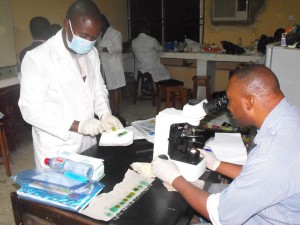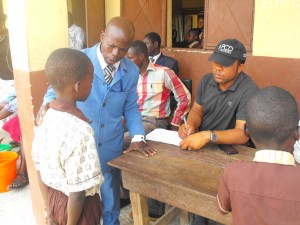To reduce child morbidity in Nigeria, the Partnership for Child Development (PCD), Imperial College London recently supported the Nigerian Government to map 7,500 children for worm infections across 150 selected schools in Osun State, Nigeria. The exercise was part of a government-led mapping carried out across six states in Nigeria which will be used to construct an effective treatment plan ensuring schoolchildren are dewormed for infections posing a threat to their health, nutrition and development.
“This exercise demonstrates the commitment from Nigeria’s Government to eradicating NTDs, which will be enabled by determining the prevalence of parasitic worm infections Soil Transmitted Helminths (STH) and Schistosomiasis”, said Nigeria’s National Coordinator for NTDs, Dr Obiageli Nebe.
Worm Impact on Children
 Currently, 00 million children around the world suffer from STHs or schistosomiasis and often fail to attend school on a regular basis, those who do attend school are unable to concentrate and learn due in large part to tired or sickness. Worm infections can cause anaemia and malnutrition which means that children don’t have the energy they would otherwise. School-based deworming is universally recognized as a safe, simple and cost-effective solution. At a cost of less than 50 US cents per child per year – the benefits of school-based deworming are both immediate and enduring. Regular treatment can reduce school absenteeism by 25%.
Currently, 00 million children around the world suffer from STHs or schistosomiasis and often fail to attend school on a regular basis, those who do attend school are unable to concentrate and learn due in large part to tired or sickness. Worm infections can cause anaemia and malnutrition which means that children don’t have the energy they would otherwise. School-based deworming is universally recognized as a safe, simple and cost-effective solution. At a cost of less than 50 US cents per child per year – the benefits of school-based deworming are both immediate and enduring. Regular treatment can reduce school absenteeism by 25%.
Mapping Training

The exercise which ran from February 20 – March 8 was carried out across Nigerian states including Osun, Kebbi, Akwa-Ibom, Lagos, Bayelsa and Kogi States. The exercise was led by the Nigerian Government with support from the Children Investment Fund Foundation, SightSavers, PCD and other development organisations. To enhance mapping effectiveness, a training of trainers workshop focused on building capacity of state technical officers and partners was held in Lagos prior to the mapping, here attendees were taught to capture data from the field using new tools including the use of android smart phones.
PCD have supported School Health and Nutrition activities in the state since 2011, assisting the government to implement its school feeding programme using local produce sourced from local smallholder farmers.
Charlotte Broyd
Communications Officer
Partnership for Child Development
Department of Infectious Disease Epidemiology